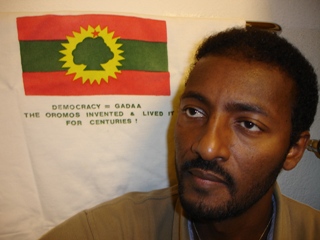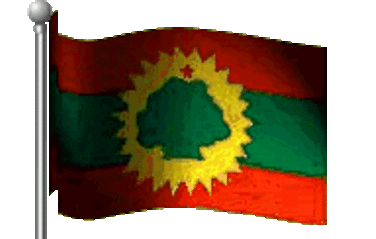Ali Bira & Kemer Yousuf: Traitors or Nationalists?

By Gurraacho Silgaa
Ali Bira and Kemer Yousuf need no introduction to Oromo communities around the world. Living in exile for over two decades, they have both been compared to Maria Makeba of South Africa for stirring hopes of freedom with their music among millions in Oromia and beyond. Music being a central part of the Oromo struggle against past and current oppressive Ethiopian regimes, Ali and Kemer acted as constant reminders of the events in their homeland.
But unlike Maria Makeba, these icons of the Oromo nation have decided to reconcile with their people’s enemy – the Ethiopian regime – before the freedom they once sung for and raised hope about among the Oromo arrived.
Ali decided to reconcile with the TPLF government in September 2005 following Ethiopian elections in the same year and while the world was in the middle of condemning the TPLF government for stealing elections by intimidating, detaining and murdering hundreds Oromos and others.
Kemer followed suite three years later and flew back to perform in Finfinnee (Addis Abeba) a couple of days ago (November 2008) hot on the heels of mass arrests, “disappearances” and mistreatment of Oromo nationals (Read Amnesty Intenational Urgent Action Request Here) including his popular fellow singer Zerhun Wedajo whose where about is unknown.
Much has been said on and off the Internet about Ali Bira’s and Kemer Yousuf’s visits to Ethiopia to perform there. To my knowledge, not since Leencoo Lataa’s visit to Ethiopia (purportedly to have Ibsa Gutema released from TPLF dungeon) has any Oromo’s visit there generated such a heated debate among our people. Opponents have painted them as traitors and sell-outs. The old adage “everyone can be bought” is heard a lot in reference to the two singers. Supporters, on the other hand, see no issues or concerns with what they have done and argue that their critics’ concerns are misplaced.
Why such a controversy over two singers’ visits to, and performance in, their home land?
No serious person can dispute Ali’s quasi-legendary status when it comes to Oromo music. That he got Oromo music going when the going was tough needs no reminding for any serious observer of Oromo cultural renaissance. Neither is Kemer’s stature as a popular and very much loved Oromo singer is contested by anyone I know. Ali’s and Kemer’s love for the Oromo language and music is beyond dispute. That much is known and beyond debate as far as I am concerned.
Ali Bira had won some ethnic music award, along with other African singers in Canada, in or around 1996. The awards were given out to the winners by ambassadors (to Canada) of their respective native countries. Ali is said to have refused to receive it from the then Ethiopian ambassador, and was given the award by the then mayor of Toronto. I have checked out this story with brothers living in Toronto who confirmed it as accurate.
Rumor has it that Kemer Yousuf was offered hundreds of thousands of dollars by the TPLF government on various occasions to return to, and perform in, Ethiopia which he rebuffed bluntly, often disdainfully. It is said that he refused to succumb to financial enticements by the powers that be in Ethiopia mindful of the political benefit the current rulers of the country would rip from his appearance there.
That was then and this is now.
Inconsistent with their prior abhorrence for the current rulers of the country (and their cronies – the OPDO), Ali and Kemer decided to return to Ethiopia and perform for their former enemies. After having successfully resisted TPLF advances for many years, Ali succumbed in 2005 and Kemer in November 2008.
The official reason for Ali’s performance there was for inauguration of “Gada Convention Center” in Adaamaa, Oromia. Kemer’s official reason for doing so, according to the Toronto Star, is "The system changed, the people changed, I changed," However, no mention of whether the system he condemned for the last seventeen years changed for better or for worse. As Oromo politicians in the country, the likes of Bulcha Damaksa and Marara Gudina attest, the Oromo situation has worsened even further over the last decade under the current Ethiopian regime. Regardless, “the central government [of Ethiopia] is helping to arrange a six-concert homecoming tour [for Kemer] that opens Dec. 7 at the East African country's largest indoor venue – Addis Ababa's 20,000-seat Millennium Hall.” And Kemer is taking advantage of it to make some bucks. Read Here
The central issue, however, is whether Ali’s and Kemer’s performances there, particularly at these critical times for the rulers of that country, impacts (positively or negatively) on the Oromo struggle for liberation and/or life expectance of the regime. It is this issue that needs to be addressed. This is not without reason. It is because of Ali’s prominence, reputation and the legendary status conferred on him by many. Although he is not considered a legend, the same goes for Kemer Yousuf. As a consequence, their fans hold them to a higher standard. Needless to say, it is fair to scrutinize public figures more closely than the average person.

This is not about Ali or Kemer the person per se. It is about Ali Bira or Kemer Yousuf the public figures and the role models for many. It is about all Oromo public figures – politicians and non-politicians alike – and how their association with enemies of the Oromo people impacts on the Oromo struggle for liberation.
After having rebuffed Wayyannee’s approach for many years, why have Ali and Kemer changed their minds at these particular times – in 2005 when TPLF and OPDO were fighting for their very lives and today when mass arrests of Oromo nationals is a daily occurrences? Why have they stopped feeling their people’s pain and suffering? In the case of Kemer, where is the solidarity with his “disappeared” fellow Oromo singer Zerhun Wedajo and the many Oromo nationals suffering in TPLF prisons at the present time? If they were so desperate to see their aging parents, as they both claim, why did they not slip in and out of the country quietly? In fact, Kemer was offered an all expenses paid rendezvous with his parents in the Middle East by Oromo nationalists which he refused to accept. Were they so desperate for money that they decided to perform for enemies of their people, or do they not consider OPDO and TPLF enemies of their people anymore? If the later, what has changed? Why would OPDO (TPLF) pay so much to have Ali and Kemer perform for them? Will their performance there contribute to prolonging or shortening the life of this regime which has wrecked havoc on the Oromo people for the last seventeen years? How much Oromo support will their popularity gain (lose) the TPLF government? What message does their performing for OPDO/TPLF send to our people back home and in the Diaspora – particularly to those who view them as role models? Will it encourage them to carry on the fight, or it will give them that “things are changing for the better” feeling and fool them in to relaxing their guards? It is these and other similar legitimate questions that propelled many compatriots in to this debate. I don’t believe any of their critics hate them but would like to know whether these larger than life personalities in Oromo music have sold their people’s struggle for liberation for a few bucks.
Their critics are concerned that (1) Their onetime heroes appear to have sold their souls to enemies of their people for the opportunity to earn some bucks (2) Their performing for OPDO/Wayyaanee will contribute to prolonging the life of the regime (3) Their association with OPDO/Wayyaanee will send the wrong message to those who look up to them as their role model – if it is ok for Ali and Kemer to perform for the enemy of our people then why is it wrong to support OPDO/TPLF? (4) Their performing for OPDO/Wayyanee has the potential of demoralizing, or setting a bad example for, other Oromo artists - inside and outside the country – engaged in agitating our people to fight to the end through their music.
Source: Oromo Affairs.





